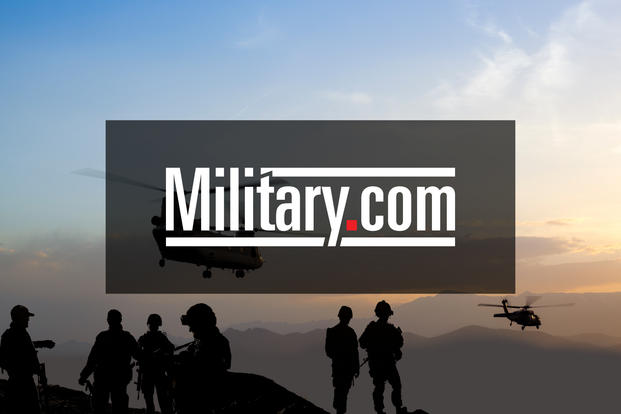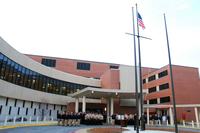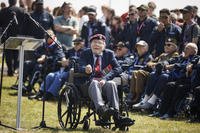High-risk Department of Veterans Affairs health workers, older veterans and minorities will be the first to be offered a COVID-19 vaccine through VA, department officials announced Tuesday.
VA will consider a patient or staff member's risk of becoming infected with the virus or likelihood of spreading the illness, along with the "risk of harm to society if essential workers are unable to work," in allocating its supply of a COVID-19 vaccine, the first of which is expected to receive emergency approval by Food and Drug Administration this week.
Read Next: Biden and SecDef Pick Lloyd Austin Have 'Crisis Tested' Bond Forged in the Situation Room
According to an information sheet published Tuesday on the VA's website, essential health care workers -- those in direct contact with patient care -- at VA will receive the vaccine first.
Veterans will then be offered the vaccine based on risk, with the oldest veterans going first, as well as minorities disproportionately affected by the virus, including Black, Hispanic and Native American veterans.
Those with pre-existing conditions like cancer, diabetes or heart disease will follow, as will those who live in high-risk environments like nursing homes and group living facilities.
VA officials said they will have a limited number of vaccines in the beginning and plan to "offer the vaccine to veterans and VA health care staff with the highest risk of getting or spreading the coronavirus."
"Over time, more vaccines will become available," officials said in the information sheet. "We'll then offer a COVID-19 vaccine to all veterans enrolled in VA health care who want one."
The FDA is expected to authorize use of Pfizer's COVID-19 vaccine candidate when it meets Dec. 10. FDA staff released a 53-page report Tuesday that found the vaccine to be highly effective and posing no safety risks that would preclude emergency authorization.
According to the documents, the vaccine has been found to be effective regardless of a patient's age, gender, race, ethnicity or preexisting medical conditions that put them at risk for a severe case of the coronavirus.
FDA officials said no serious safety concerns were seen in the Phase III clinical trials of the vaccine, made through a partnership between Pfizer and BioNtech, but did find that those who received it reported common side effects -- especially on the second dose, including headaches, fatigue, muscle pain and fever.
The FDA vaccine panel has scheduled another meeting Dec. 17 to consider emergency use for Moderna's vaccine candidate. Should the Moderna vaccine receive an emergency use authorization, doses of it would immediately be disseminated to prestaged locations and delivered to health facilities and pharmacies for use.
The Pfizer and Moderna vaccine use a new technology to provoke an immune response to the COVID-19 coronavirus -- inserting genetic instructions into body cells to produce the spike protein seen on the virus, triggering the immune system.
According to VA, veterans will not be able to select which vaccine they get, at least in the beginning.
"For the first several months we wouldn't have enough vaccine to allow for this. We will reassess as more vaccines become available," VA wrote in its FAQ sheet.
The VA plans to offer the vaccine free of cost eventually to all veterans enrolled in VA health care who want one, according to officials.
VA health administrators began sending forms to front line health care workers last month asking whether they wanted to receive the vaccine and would provide consent. It's likely any veteran who gets the vaccine will have to complete paperwork, known as informed consent, to receive the vaccine.
Both the Moderna and Pfizer vaccine will require two rounds of immunization -- an initial shot followed by a booster 21 to 28 days later. VA officials said they will monitor all patients who receive the vaccine for side effects or adverse events, categorized as a severe reaction beyond observed side effects.
Older veterans have been among the hardest-hit Americans affected by the coronavirus. Hundreds have died in state-run veterans homes and many have perished in VA hospitals and in their homes.
On Monday, VA recorded a record number of active cases of COVID-19 in the VA health system: 16,405. By Tuesday, the number of hospitalized cases had dropped by 751 to 15,654, but VA also recorded 149 new deaths in that same timeframe.
Since the outbreak began, 122,987 veterans, staff members and others who receive health services have been diagnosed with COVID-19 and 5,378 have died, including 76 employees.
Nationwide, more than 15 million Americans have contracted COVID-19, first detected over a year ago in China, and 283,825 have died.
VA continues to participate in clinical trials for several vaccine candidates and is seeking volunteers for that research.
More than 50 VA medical centers are supporting the research for vaccines developed by Moderna, AstraZeneca and Janssen. The Cleveland VA Medical Center was involved in research on the Pfizer vaccine.
The studies are now searching for volunteers over age 65, those with long-term health conditions and minorities for the research. More information can be found on the VA's website.
-- Patricia Kime can be reached at Patricia.Kime@Monster.com. Follow her on Twitter @patriciakime.
Related: VA Needs 8,000 Healthy Volunteers for COVID-19 Vaccine Trials












